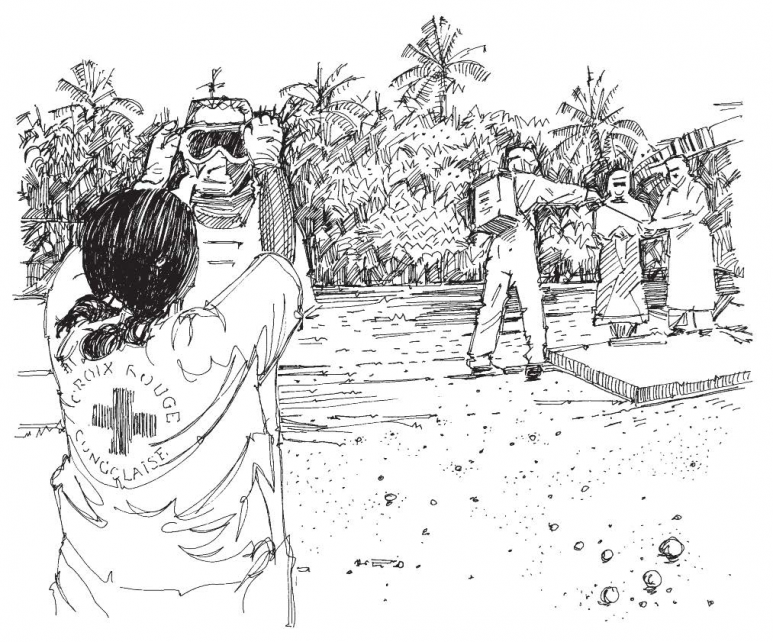05. Volunteer protection and safety
Overview
Volunteers work in vulnerable situations and with people of many capacities. Working in epidemics can be risky because volunteers can also catch a disease and fall sick. In addition to physical risks, there may be risks to volunteers’ emotional and mental well-being, due to the nature of the work they undertake. It is important to protect from and minimize the impacts of these risks.
Your National Society should provide proper protection for you and other volunteers who are working in epidemics. Your manager is a valuable resource for information and equipment to protect and preserve your physical, emotional and psychosocial wellbeing.
It is important to follow the guidance from your supervisor and National Society and use the level of protection that is appropriate for the situation you are in.
What to do and how to do it
Protecting yourself and others from disease
- You must be familiar with and trained to use protective equipment before you wear it in an actual disease environment. Try the equipment out beforehand and learn how to use it properly.
- In certain epidemics like Ebola, Marburg, Lassa fever and plague, full protection should be used whenever you undertake high risk activities. Full protection requires use of personal protective equipment (PPE). (See Action tool Personal protection equipment (PPE) for highly infectious diseases)
- In other epidemics, you should at least use masks and latex gloves and wash hands with soap after contact with an affected person or animal. (See Action tool Handwashing with soap for instructions in good hand hygiene.)
- Volunteers should be vaccinated according to country-specific vaccination guidelines (see Action tool Routine vaccinations).
- Volunteers should be vaccinated according to the routine vaccination schedule in the country
- Volunteers may be eligible for vaccination during mass vaccination if applicable
- Volunteers should be alert to their own physical and psychosocial well-being during an epidemic
- Volunteers should be alert to stressors in their personal and working lives, and should have a plan in place for how to cope with stress and trauma in a healthy and helpful way
- This may include stress management techniques that you already use such as exercise, meditation, taking part in hobbies, etc.
- Your manager is a useful resource for information and tools to use to help you achieve and maintain psychosocial well-being
- Volunteers should be alert to stressors in their personal and working lives, and should have a plan in place for how to cope with stress and trauma in a healthy and helpful way
Understanding common prevention and control measures
Volunteers should learn additional prevention measures for use in epidemics (and before them). These include:
- Vector control measures (see Action tool Vector control)
- Safe handling of animals (Action tool Handling and slaughtering animals)
- Chemoprophylaxis (Action tool Chemoprophylaxis)
- Safe food and water (Action tools Good food hygiene and Clean, safe household water)
- Hand hygiene (Action tools Handwashing with soap and Handwashing in a highly infectious epidemic)
Protecting volunteers from harm and liability to others
- Volunteers should be protected if they suffer damage or injury in the course of their work. Accidents can happen, and volunteers can be injured or even killed. Equally, volunteers can harm other people and their property, especially if they have not been properly trained or given the correct equipment.
- National Societies therefore need to have appropriate insurance policies. Insurance may be needed to pay compensation to volunteers or their families if they are injured or killed; to pay compensation to others if they suffer harm as a result of volunteer actions; and to cover legal costs. The nature of the cover will depend on the legal system in your country. The Movement urges the National Societies to acknowledge and uphold their duty of care towards volunteers, especially if something should happen to them while carrying out their duties. Ask your manager about the type of insurance or coverage through a “safety net” you can receive.
- Prior to asking volunteers to perform activities that are high-risk (e.g. safe and dignified burials), National Societies should also ensure volunteers have received the necessary vaccinations and protective equipment. What this includes will depend on the context in which you are working and the health policies for staff and volunteers of your National Society.
- Volunteers should be informed of and understand the National Society’s security policy and follow the rules and regulations it sets out. You should also be informed of any changes in the policy and asked to report any incidents of concern.
- Safety in the community depends on the personal attributes of volunteers, trainers and other team members – how they work together and how they collaborate with people in the community. Volunteers should be culturally sensitive. Your personal behaviour should never cause offence. You should show integrity and should never become a problem for the community. Correct, polite, impartial behaviour is always expected.
- Volunteers should be proactive in managing and maintaining their own safety and security. This means you should not hesitate to ask your manager about safety and security risks and what you should do if you encounter any threats or have any problems. You should find out what protocols are in place if a safety or security incident occurs, including how and to whom you should report these events.
